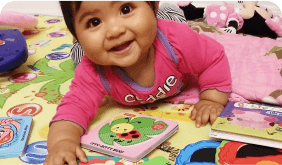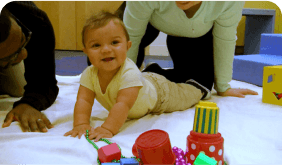Is Baby sleeping during the day, and staying up all night? Don’t worry, you’re not alone; many babies (and parents!) struggle with day-night confusion. Learn more about day-night confusion for babies and how to help Baby regulate newborn sleep patterns.
What causes day-night confusion?
Baby isn’t born with what’s called a circadian rhythm. This rhythm is like your internal alarm clock; it helps you know when it’s time for bed, and when you should wake up. Because Baby isn’t born with this, they don’t have that same sense of sleepiness at night and wakefulness during the day.
Part of the reason Baby doesn’t have this rhythm is because they spend 9 months in a very dark environment in the womb. With darkness all the time, they can’t tell the difference between day and night— it takes a few months to learn this!

When will Baby have day-night confusion?
Typically this will happen right after birth. It takes Baby a few months to establish a circadian rhythm; usually Baby’s sleep pattern improves around 4 months. However, some babies may need a little extra time to get a pattern down.
How can you help your baby resolve their day-night confusion?
Keep their room dark when sleeping. This includes naps! This will help strengthen the connection between darkness and sleep. See these tips to get Baby’s room totally dark.
Expose Baby to light when awake. Bring them near a window or if the weather is mild, you can bring them outside when awake. This helps them associate light with being alert and awake.
Meet Baby’s basic needs. Make sure Baby is fed, changed, and comfortable whenever possible. Sleep will be the best when Baby feels safe and cared for.
Should I be concerned if Baby is experiencing day-night confusion?
Day-night confusion is very typical for Baby! So no, there is no cause for concern in the early months of life. However, it’s important to acknowledge that day-night confusion can be exhausting for parents and caregivers. Be sure to take care of yourself, and don’t be afraid to ask for extra support if needed.
If Baby is still experiencing day-night confusion at 6 months, talk to a healthcare provider. They’ll be able to give you some tips on how to resolve this for Baby!





